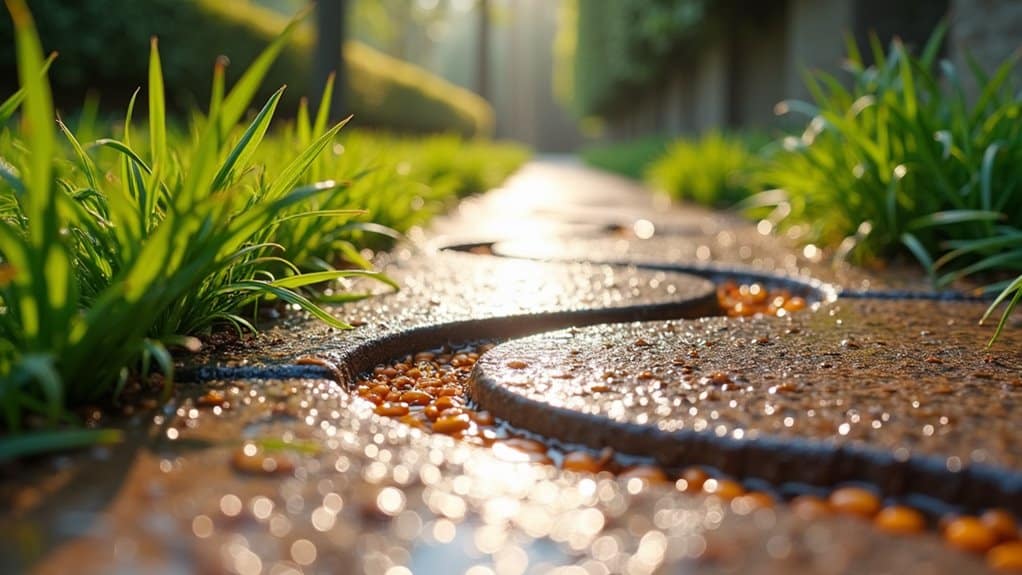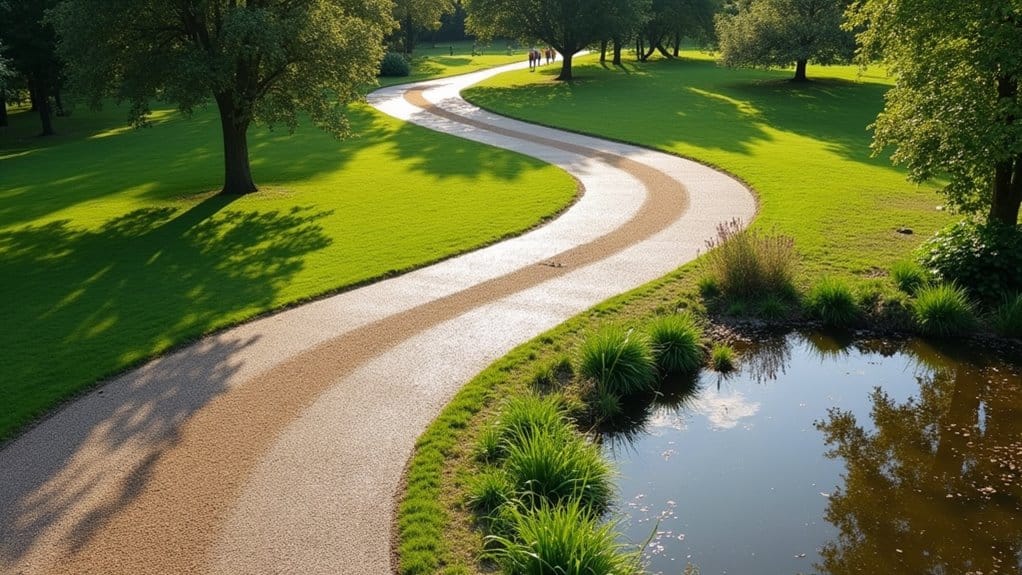Resin bound surfacing sorts out drainage issues through its porous design, letting rainwater soak straight into the ground below. This clever system cuts down on surface water and takes pressure off local drains – particularly handy during Britain's notorious wet spells. Think of it as a giant sponge: water passes through naturally, topping up underground water reserves whilst catching nasty pollutants before they cause trouble. You'll spot this practical solution everywhere from residential driveways to town centres, where it helps tackle flooding whilst looking smart. Perfect for our rainy climate, it's a sensible choice for any property wanting better water management.
Key Takeaways
Resin bound surfaces let rainwater soak straight through, drastically cutting down flooding risks – much like a giant sponge for your driveway or patio.
The surface naturally filters out nasty bits from rainwater before it reaches the soil, helping keep our local streams and groundwater clean whilst preventing puddles and waterlogging.
By allowing water to seep into the ground naturally, these surfaces help top up underground water supplies that trees, plants and wildlife depend on.
They're fully compliant with UK drainage regulations (SUDS), making them ideal for urban areas where traditional concrete and tarmac often lead to overwhelmed drains during heavy rain.
Built to last through British weather, these surfaces handle everything from car traffic to downpours without breaking up or losing their drainage ability – meaning less hassle and fewer repair bills over time.
Permeability and Water Drainage
Permeability and Water Drainage
Resin bound surfacing offers outstanding water drainage capabilities, outperforming traditional block paving. Its highly permeable structure lets rainwater filter straight through to the ground below, meaning you won't see puddles forming even during heavy British downpours.
Think of the surface like a coffee filter – the tiny gaps between stones allow water to pass through naturally, just as the ground would absorb rainfall in nature. This makes it particularly useful in British gardens, driveways and public spaces where rain is a constant concern. Additionally, this eco-friendly option is designed to help manage stormwater runoff effectively, further supporting local ecosystems.
The system's effectiveness helps tackle common UK drainage issues by reducing strain on local sewers and cutting the risk of flooding. It fully complies with Sustainable Urban Drainage Systems (SUDS), making it an environmentally sound choice for British properties. Notably, Vuba Resin Bound is 19 times more permeable than block paving, which further enhances its drainage capabilities.
During wet weather, you'll notice the difference as water simply disappears into the surface rather than running off or forming pools.
Stormwater Management Benefits
Stormwater Management Benefits
Effective stormwater management is vital for UK towns and cities, particularly during heavy rainfall which can overwhelm drains and damage infrastructure.
Resin bound surfacing delivers key benefits for managing water runoff:
- Flood Prevention: The permeable surface lets rainwater soak into the ground naturally, reducing surface runoff. This cuts flood risks and prevents waterlogged roads and pavements common in British weather. The unique formulation of resin bound surfaces provides (flexibility and resistance) that helps withstand the changing weather conditions.
- Water Cycle Support: By allowing water to filter through to underground aquifers, resin bound surfaces maintain natural water cycles. This reduces the load on local drainage systems and helps conserve water resources. Additionally, the use of permeable surfaces also reduces reliance on extensive drainage systems.
- Erosion Control: The surface filters water gradually, preventing soil erosion and reducing polluted runoff. This keeps local streams and rivers cleaner by stopping soil and nutrients from washing into waterways during storms. The cold-pour technique used in installation contributes to flexible and durable surfaces that can better withstand heavy rainfall.
Resin bound surfacing offers practical solutions for British communities facing increased rainfall and flooding risks.
It protects local infrastructure while supporting sustainable water management – particularly valuable for areas prone to waterlogging or with outdated drainage systems.
Environmental Impact

Resin bound surfaces offer impressive environmental benefits, particularly for water management.
The permeable nature of these surfaces allows rainwater to naturally drain through, helping replenish groundwater levels whilst filtering out pollutants. This system proves especially valuable in British cities, where flooding and water pollution pose increasing challenges, as permeability reduces flooding risk and supports local wildlife while reducing strain on traditional drainage systems. Additionally, the eco-friendly construction practices associated with resin bound surfaces promote sustainable sourcing of materials, further enhancing their environmental impact.
Eco-Friendly Water Management
Resin bound surfacing serves as a vital component in eco-friendly water management across the UK, improving drainage and reducing flood risks. The permeable nature of these surfaces allows rainwater to filter through naturally, supporting both water harvesting and landscape integration.
Three primary advantages:
- Reduced Surface Runoff: Water drains directly into the ground rather than pooling on the surface, which helps prevent localised flooding on British driveways and streets whilst easing pressure on council drainage systems. This approach is essential for effectively managing water resource management and ensuring sustainable water availability.
- Pollutant Filtration: The surface acts as a natural filter, trapping common pollutants like motor oil and debris before they reach our groundwater and local waterways.
- Sustainable Compliance: Meeting UK Sustainable Urban Drainage Systems (SUDS) requirements, resin bound surfaces are increasingly popular for new builds and renovations, particularly in flood-prone areas.
Groundwater Recharge Benefits
Resin bound surfacing's permeable qualities play a crucial role in groundwater recharge, helping maintain ecological balance across UK towns and cities. When rain falls, these surfaces allow water to filter through naturally, topping up underground water reserves and providing natural filtration. The SUDs compliance of resin bound surfaces further enhances their effectiveness in managing surface water runoff.
| Groundwater Recharge Benefits | Description | Impact on Environment |
|---|---|---|
| Water Infiltration | Lets rainwater soak into the ground | Cuts surface water runoff |
| Aquifer Replenishment | Tops up underground water reserves | Keeps groundwater levels steady |
| Soil Stability | Stops soil becoming compacted | Lowers ground subsidence risk |
| Drought Mitigation | Stores water for dry spells | Boosts water security |
The system's layered structure ensures steady water absorption, much like a natural soil profile. This approach is particularly valuable in urban areas where concrete and tarmac typically prevent water absorption. Think of it as giving our cities the ability to 'breathe' naturally again, supporting local wildlife and plant life while reducing flood risks.
These surfaces are especially relevant given the UK's changing climate patterns, offering a practical solution for towns and cities dealing with both flooding and drought concerns. The natural filtering process also helps improve water quality, making it a smart choice for sustainable urban development.
Pollution Reduction Efforts
Reducing pollution is a key advantage of resin bound surfacing in UK cities and towns. This surface material helps control pollution and protects local environments in three main ways:
- Natural Filtration: The surface naturally filters water, catching pollutants before they reach our streams and rivers.
- Less Surface Water: The permeable surface reduces flooding and stops nutrient-heavy water from damaging nearby waterways. Additionally, its compliance with SuDs Regulations ensures effective management of surface runoff.
- Erosion Prevention: The surface keeps soil in place, stopping sediment from washing into water systems.
These features directly lower pollution in urban water bodies. When surface water runoff decreases, fewer fertilizers and pollutants end up in our waters, preventing problems like algal blooms.
The surfacing also supports Sustainable Urban Drainage Systems (SUDS), meeting UK environmental standards and boosting green initiatives.
Choosing resin bound surfacing means investing in both infrastructure and environmental protection. It's a practical step towards cutting urban pollution and creating cleaner, healthier British towns and cities.
Benefits in Urban Areas
Benefits in Urban Areas
Resin bound surfacing plays a crucial role in managing water across Britain's urban spaces. The permeable surface allows rainwater to drain naturally, much like grass or soil would, rather than forming puddles or overwhelming storm drains. This practical solution helps prevent flooding on streets and pavements, particularly valuable during heavy British rainfall.
In city centres, where concrete and tarmac dominate, these surfaces significantly reduce flood risks. Think of traditional shopping precincts after a downpour – they often become treacherous with standing water. Resin bound surfaces eliminate this problem whilst meeting Sustainable Urban Drainage Systems (SUDs) requirements, helping filter out pollutants before they reach our waterways. Additionally, the use of natural aggregates in the resin bound mix further enhances its environmental sustainability. Furthermore, the durability of resin driveways ensures that urban surfaces can withstand heavy traffic and adverse weather conditions without rapid deterioration.
The system proves cost-effective for councils and property owners alike. Unlike traditional surfaces that crack and deteriorate with water damage, resin bound paths and driveways remain sturdy through seasonal changes. This durability means fewer repairs and better value for money over time.
For urban planners and developers, these surfaces tick both practical and environmental boxes. They help create safer, more attractive urban spaces whilst supporting local water management efforts – essential for Britain's increasingly unpredictable weather patterns.
Cost Savings

Cost Savings
Resin bound surfacing offers significant cost benefits alongside its drainage advantages when compared to traditional paving. The system proves economically sound in both immediate and long-term applications.
Three key cost-saving benefits:
- Material Costs: At £40-£70 per m², resin bound surfaces cost less than many conventional options like block paving or concrete.
- Reduced Maintenance: The durable, stain-resistant nature means minimal upkeep costs. Repairs and cleaning are rarely needed, saving both time and money. Regular maintenance is essential for extending driveway life.
- No Additional Drainage: Being naturally porous eliminates the need for separate drainage systems, cutting both installation and ongoing maintenance costs. This feature aligns with Sustainable Urban Drainage Systems (SUDS) regulations, enhancing its appeal for eco-conscious projects.
Whilst professional installation is essential, the lasting durability and minimal maintenance requirements make resin bound surfacing a sound financial investment for British urban spaces.
The system delivers clear value through reduced upkeep costs and exceptional longevity.
Practical Application
Resin bound surfacing offers practical solutions across UK properties, combining good looks with genuine functionality.
The permeable nature of these surfaces helps tackle common British weather challenges, letting rainwater drain naturally into the ground rather than flooding paths and driveways. This surfacing option is designed to comply with Sustainable Urban Drainage Systems (SUDS), ensuring effective stormwater management. Additionally, the use of a solid sub-base contributes to the durability and effectiveness of the drainage system, enhancing its overall performance.
Perfect for domestic driveways, garden paths and public spaces, this surfacing option proves particularly valuable in urban areas where water management is crucial.
Its versatility makes it equally suitable for both modern housing developments and period properties whilst supporting local flood prevention efforts.
Versatile Surfacing Solutions
Versatile Surfacing Solutions
Resin bound surfacing offers remarkable flexibility across different settings whilst ensuring proper drainage and long-lasting performance.
It's particularly well-suited to British weather conditions and meets UK building regulations.
- Driveways and Patios: Perfect for home driveways and garden patios, where our frequent British rain needs somewhere to go. The permeable surface prevents puddles and allows water to drain naturally into the ground.
- Flood-Prone Areas: Particularly useful in British commercial spaces and high-risk flood zones, where the surface significantly cuts down water build-up and localised flooding. Additionally, the slip-resistant and waterproof properties of resin bound surfacing enhance safety during wet conditions.
- Landscaped Areas: Works brilliantly in both domestic gardens and commercial landscapes, supporting SUDS compliance by allowing natural water drainage – essential for UK planning requirements.
The practical benefits make it a smart choice for UK property owners looking to tackle drainage issues whilst maintaining an attractive finish.
#
Aesthetic and Functional Design
The blend of visual appeal and practical function makes resin bound surfacing an excellent choice for outdoor spaces. The surfaces look stunning whilst delivering robust performance and minimal upkeep. Choose from numerous patterns and colours to create bespoke designs that match your vision and serve your space effectively. Additionally, the permeable surface allows for effective water drainage, further enhancing its functionality.
| Feature | Aesthetic Benefits | Functional Benefits |
|---|---|---|
| Material | Natural aggregates create contemporary looks | Durable surfaces withstand heavy use |
| Customisation | Offers varied patterns and textures | Needs only occasional washing |
| Non-Fading | UV resistant for lasting colour | Permeable surface prevents water pooling |
| Seamless Surfaces | Smooth, sophisticated finish | Provides reliable grip |
| Eco-Friendly | Made with sustainable materials | Works with natural drainage |
Resin bound surfaces strike an ideal balance between looks and practicality. Whether for a garden path or driveway, these surfaces deliver both kerb appeal and lasting performance. Perfect for British weather, they handle rain effectively whilst maintaining their appearance year-round.
Effective Urban Flood Mitigation
Urban Flood Mitigation for UK Communities
British towns and cities increasingly struggle with flooding, requiring robust solutions to protect our communities and vital infrastructure. These practical strategies can strengthen local flood resilience:
- Integrated Flood Response:
- Merge drainage and sewerage systems to bolster readiness
- Move beyond traditional sandbags to modern defence systems, including localised flood alerts and pre-emptive measures
- Urban Planning and Flood-Resilient Design:
- Restrict development in flood-prone areas through proper zoning
- Add natural drainage solutions like permeable surfaces in car parks and green roofs on new buildings, as these green infrastructure solutions effectively reduce runoff.
- Modern Protection Systems:
- Install temporary flood barriers using advanced materials, similar to those protecting riverside properties along the Thames
- Maintain and upgrade existing defences regularly to prevent blockages, particularly critical in autumn when leaves clog drains
Each measure becomes particularly important given Britain's increasingly wet winters and the growing pressure on our Victorian drainage systems.
Local councils should prioritise these improvements to protect homes and businesses from rising flood risks.
Long-term Sustainability

Resin bound surfacing stands as a lasting solution for drainage and flood prevention in the UK. It fully complies with Sustainable Urban Drainage Systems (SUDS), allowing water to seep naturally into the ground rather than overwhelming storm drains. This practical approach helps prevent localised flooding, particularly useful during Britain's frequent wet spells.
The material proves remarkably durable, withstanding temperatures up to 250 degrees and lasting over 20 years without cracking or fading – ideal for our varied climate. Additionally, Oltco's resin bound surfaces are guaranteed against cracking, loose stones, and color change, ensuring long-term durability for property owners. Moreover, the superior drainage capabilities of resin bound surfacing mitigate risks related to flooding compliance with UK regulations.
Maintenance couldn't be simpler: a quick pressure wash once or twice yearly keeps it in top condition, saving both time and money compared to traditional surfaces.
The environmental benefits are significant. Take Recycle Bound, for instance – each square metre contains around 3,000 recycled plastic straws, helping tackle the UK's plastic waste problem.
Beyond the eco-credentials, it's cost-effective, reducing both groundwater management costs and flood risks. For British property owners and councils looking for sustainable surfacing solutions, resin bound surfaces tick all the boxes.
## Aesthetic and Functional Design
Resin bound surfacing offers both kerb appeal and practical benefits, making it a smart choice for modern British properties. The system delivers effective drainage whilst creating an attractive finish for your outdoor spaces.
Key features include:
- Design Options: Choose from multiple stone sizes and colours to complement your property's style.
- Professional Finish: Creates a level, attractive surface that's safe for walking and wheelchair access.
- Responsibly Sourced: Uses materials from UK quarries, supporting local industry whilst delivering quality results. The combination of resin and aggregate stones ensures a durable and aesthetically pleasing surface.
The porous nature of resin bound surfaces handles British weather effectively, preventing puddles and reducing flood risks in urban areas. This is due to its permeable design, which allows water to filter naturally through the layers, maintaining ground water balance and protecting against surface water build-up.
Unlike traditional paving, it needs minimal upkeep to stay looking smart.
For property owners seeking practical drainage with lasting visual appeal, resin bound surfacing ticks both boxes.
Case Studies and Examples

Real-world examples show clear benefits of resin bound surfacing across the UK.
At RHS Rosemoor, Terrabound's porous surface effectively handles rainfall, proving its worth in water management.
The Lee Valley Cycle Superhighway's Sudstech paving prevents standing water, making cycling safer whilst improving drainage. This aligns with the need to identify project type for accurate support throughout implementation.
Exchange Quay's large-scale Sudstech installation tackles urban drainage challenges head-on in its communal spaces.
At a UK school, Langford Direct Ltd created a practical beach-effect playground using Sudstech, ensuring natural water drainage.
Waltham Forest Council made significant savings on drainage costs by choosing Sudstech for their cycle lane development.
These examples highlight how resin bound surfacing tackles flooding and drainage issues effectively.
The results speak for themselves: better water absorption, less runoff, and full compliance with Sustainable Urban Drainage Systems (SUDS) requirements – making it an ideal choice for modern British infrastructure projects.
Frequently Asked Questions
How Does Resin-Bound Surfacing Compare to Traditional Paving Materials?
Resin-bound surfaces offer distinct advantages over traditional British paving options like concrete or tarmac. The smooth, modern finish lends itself particularly well to driveways and garden paths, whilst requiring less time to install than conventional block paving. Unlike traditional materials that often need extensive groundwork, resin-bound surfaces can typically be laid directly onto existing concrete bases, saving both time and labour costs.
Can Resin-Bound Surfaces Withstand Heavy Vehicle Traffic?
Resin-bound surfaces require a reinforced base to handle heavy vehicles, much like a motorway needs proper foundations. Without adequate support, these surfaces won't cope with substantial weight loads. For domestic driveways, they're brilliant, but for areas with lorries or constant heavy traffic, you'll need enhanced structural support and proper groundwork. The key is proper installation – get it right, and you'll have a durable surface that lasts.
What Maintenance Is Required for Resin-Bound Surfaces?
Regular sweeping and pressure washing keep resin-bound surfaces in top condition. Remove fallen leaves, dirt and other debris before they settle, and clean up any oil or fuel spills straight away. Check periodically for cracks or loose stones, and tackle any moss or weeds with appropriate UK-approved treatments to prevent surface damage.
Are There Color Options Available for Resin-Bound Surfacing?
Resin-bound surfacing comes in a wide range of colours, making it incredibly versatile for British homes and businesses. Standard options include natural stone shades like grey, buff and brown, whilst bolder choices such as red, blue and green are also available. Property owners can blend different colours to create unique patterns or stick to single shades for a classic look. Many UK suppliers offer colour samples to help with decision-making before installation.
How Does Weather Affect the Installation of Resin-Bound Surfaces?
Weather plays a vital role in resin-bound surface installation. The temperature must be at least 5°C and rising for proper curing – think of it like waiting for paint to dry on a cold day. High humidity can trap moisture beneath the surface, leading to clouding and bubbles, whilst rain is an absolute no-go as it prevents proper bonding. For best results, install on a dry day with mild temperatures between 5-25°C, much like choosing the right day for laying a patio.
Conclusion
Resin bound surfacing offers more than just visual appeal – it's a practical solution for water management on your property. With its impressive 90% permeability rate, the surface effectively handles rainwater by allowing it to drain naturally into the ground below. This significantly reduces the risk of surface flooding and puddles, particularly useful during Britain's frequent heavy rainfall. Much like how garden soil absorbs water, resin bound surfaces help manage stormwater whilst providing a durable, attractive finish to driveways and pathways.
